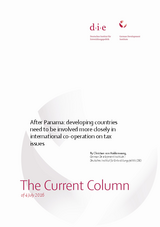After Panama: developing countries need to be involved more closely in international co-operation on tax issues
von Haldenwang, ChristianThe Current Column (2016)
Bonn: German Development Institute / Deutsches Institut für Entwicklungspolitik (DIE) (The Current Column of 4 July 2016)
Bonn, 4 July 2016. Two major mechanisms squeeze the tax base in developing and emerging countries: rich individuals evade their tax obligations by moving money abroad and submitting false statements regarding income and assets. Large, multinational companies exploit international loopholes in laws and regula-tions and shift profits artificially to states with particularly low rates of taxation. As different as these two behavioural patterns are, they both converge on one key point: companies such as Mossack Fonseca and countries such as Panama provide the know-how and infrastructure to avoid and evade paying taxes. They are part of an international system, the sole purpose of which is to circumvent the efforts of states to collect taxes. The beneficiaries are the free riders in the global system – tax havens, corrupt elites, criminal gangs and companies operating on the borders of legality. To date there is scarcely any sound knowledge of the extent to which developing countries suffer from tax avoidance and evasion. However, the existing studies enable two general statements to be made: Firstly, the poorer countries are affected more than richer industrialised countries with regard to their economic strength and tax base. This is primarily due to the fact that they are dependent on capital imports and tax payments from a small number of large companies. Low state capacity and the political influence of national elites also play a role. Secondly, the amount of financial assets hidden in tax havens and the annual flows of capital from developing and emerging countries have increased further since the global financial crisis of 2009. This contradicts the impression given that measures introduced under the aegis of the OECD, the EU and the G20, for example to improve the exchange of information between tax authorities, had already resulted in effective curtailment of the problem. Whether and when the new measures will actually take effect remains open at this time. Multinational companies in particular utilise the business model of tax havens and loopholes in the international tax system to dramatically lower their tax burden. A number of these practices are almost impossible to identify, let alone rectify. For example, even the industrialised nations find it very difficult to monitor the pricing of financial services and intangible assets by multinational groups. To many developing countries this represents an even greater challenge. Other problems are easier to identify, but tackling them requires a high degree of openness to bilateral co-operation and state capacity. The effects are grave: the countries affected are deprived of the necessary resources for the realisation of development policy objectives. In addition, public investments (e.g. in energy, transport, communications) often have a key leverage effect on the investment behaviour of private providers of capital. A fiscal system that is regarded as unfair can significantly endanger the legitimacy of the state. Bilateral co-operation needs to be extended to strengthen the capabilities of tax authorities in developing countries. A broad consensus exists with regard to this in the field of development policy. Establishing databases and information systems is of key importance here. In many cases this also includes the strengthening of national statistics authorities and the improved exchange of information amongst state bodies. In addition, public access to data regarding multinational companies, major commodity extraction projects etc is also important. At an international level, a range of efforts are currently being made to close regulatory loopholes. Many of these measures require bilateral agreement between states. This includes, for example, the automatic exchange of tax information. However, poorer developing countries are overwhelmed by the principle of reciprocity. Industrialised countries should allow for a certain degree of asymmetric behaviour regarding this. Even more importantly: bilaterally anchored measures are aligned more towards countering sophisticated tax avoidance and evasion schemes with equally complex mechanisms of regulation and co-operation. However, it is questionable whether developing countries with limited state capacity are capable of following this path. Multilateral approaches that place the taxation of companies on a uniform basis and ensure that the necessary data is collected and made available at an international level would help to promote this development. Such an approach would have the potential to align taxation more towards economic activities, render tax evasion and avoidance more difficult and at the same time ease the burden on less capable countries. With its strong export industry, Germany, too, stands to gain more than it loses in the medium term from increased international co-operation on tax issues.


